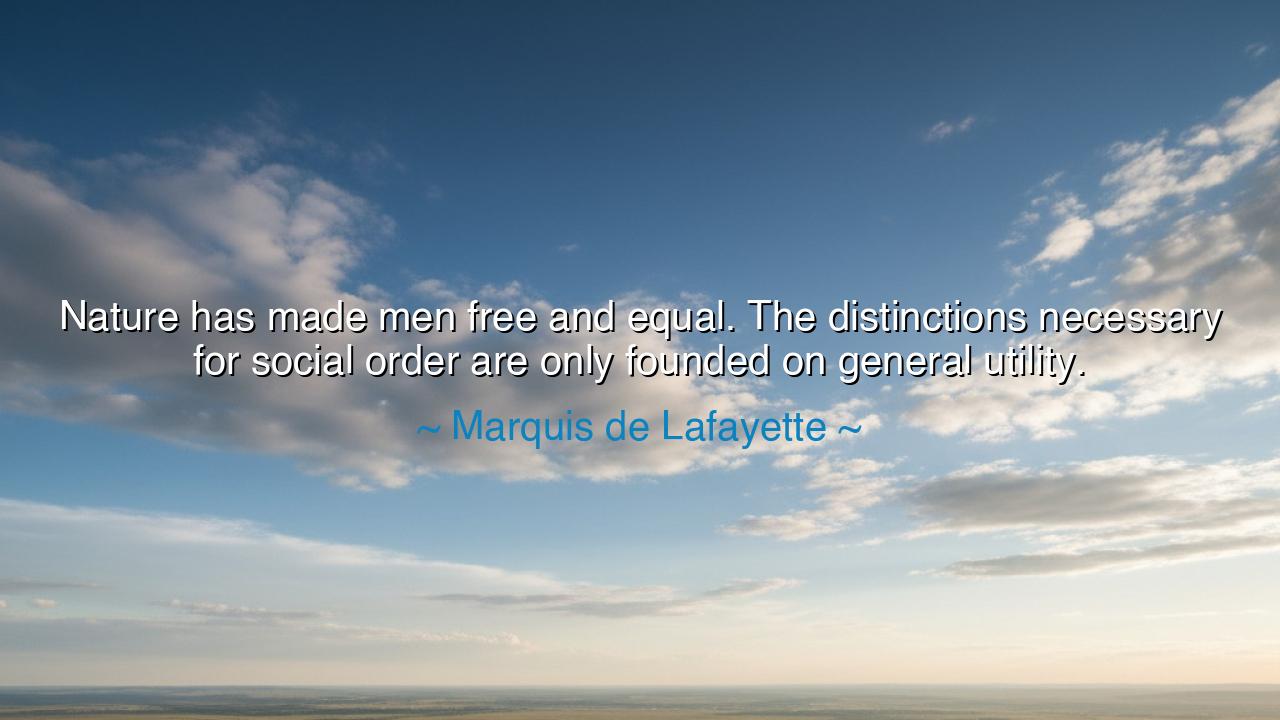
Nature has made men free and equal. The distinctions necessary
Nature has made men free and equal. The distinctions necessary for social order are only founded on general utility.






The words of Marquis de Lafayette—“Nature has made men free and equal. The distinctions necessary for social order are only founded on general utility.”—are the cry of a man who stood with one foot in the Old World and the other in the New, bridging the age of kings with the dawn of liberty. They are words born of fire, tempered by both revolution and reason. In them lies a vision of humanity’s divine design: that freedom and equality are not granted by monarchs or governments, but bestowed by Nature herself, and that any distinction between man and man must serve not pride, but the common good. It is a declaration both humble and heroic, at once a challenge to tyranny and a reminder of duty.
The origin of this quote reaches back to the late eighteenth century, when Lafayette, a young French nobleman, became the living embodiment of the Enlightenment’s ideals. He crossed the sea to fight beside George Washington in the American Revolution, not for conquest or wealth, but for the cause of liberty. When he returned to France, he carried with him not just the scars of war, but the seed of a new faith—that all men are born equal in worth and right. In the chaos of the French Revolution, he helped draft the Declaration of the Rights of Man and of the Citizen, from which this very sentiment breathes. Lafayette sought a balance between freedom and order, knowing that unrestrained liberty can descend into anarchy, and rigid order into despotism. His words were not the dreams of an idealist, but the reasoned creed of a reformer who had seen both the glory and peril of revolution.
In saying that “Nature has made men free and equal,” Lafayette was invoking a truth older than kings and deeper than law—the natural law that binds all living souls in common dignity. Before birth, no one is noble or base, rich or poor. In the sight of nature, the beggar’s breath is as precious as the emperor’s. Yet Lafayette, with wisdom rare among revolutionaries, did not deny the necessity of distinctions in human society. He saw that order requires roles, that civilization stands upon structure. But, he declared, those distinctions must arise only from utility, from service to the whole, not from the arrogance of birth or the corruption of privilege. The farmer, the soldier, the scholar—all may differ in their labors, yet none in their worth.
History offers proof of this sacred balance. When Washington resigned his commission after the American Revolution, he could have seized the crown that the people offered him. Instead, he laid down his sword and returned to his farm, showing the world that leadership is service, not domination. His act echoed Lafayette’s principle: that distinctions of rank must exist only for the good of all. A general commands not because he is greater in nature, but because his role serves a higher purpose—the defense of liberty. The moment a leader forgets that his authority is a trust and not a throne, equality perishes, and freedom with it.
Lafayette’s words also warn against the corruption of societies that forget their natural origins. When distinctions become chains—when wealth, birth, or power replace merit and service—the soul of a nation decays. So it was in France before the Revolution, where nobles feasted while peasants starved, and the church preached submission instead of justice. The Revolution, born from the people’s suffering, sought to restore what Nature had decreed—that no man is born to rule another. Yet, as Lafayette foresaw, equality without purpose can become chaos. He sought not to erase difference, but to sanctify it with meaning—to make hierarchy the servant, not the master, of humanity.
There is a quiet grandeur in his vision. For Lafayette’s equality is not a leveling of all men into sameness, but a harmony of differences—like instruments in an orchestra, each playing its part for the beauty of the whole. Freedom, in his eyes, was not rebellion against order, but the perfection of it; equality was not the destruction of rank, but its purification. A society founded upon these truths becomes like a body in health, where each organ serves its function, yet all share the same life-blood of dignity. To forget this, to let one part feed upon another, is to bring decay to the entire form.
So, my child, remember this lesson: Nature made you free, and that freedom is sacred—but it was never meant for selfishness. Equality does not mean the erasure of all difference, but the respect of every soul. Whatever your place in the world—leader or laborer, teacher or learner—let your distinction be one of service. Seek not power, but purpose. Measure your worth not by what you command, but by what you contribute. For as Lafayette taught, liberty without equality is tyranny disguised, and equality without service is chaos unbound.
Thus, his words remain an eternal guide: “Nature has made men free and equal.” Hold this truth as a flame within your heart. Let every action, every law, every choice you make honor the divine balance between freedom and order. For when each person lives not for domination, but for the general utility—for the good of all—then humanity walks once more in harmony with the laws of Nature, and liberty becomes not a dream, but a living, breathing truth.






AAdministratorAdministrator
Welcome, honored guests. Please leave a comment, we will respond soon